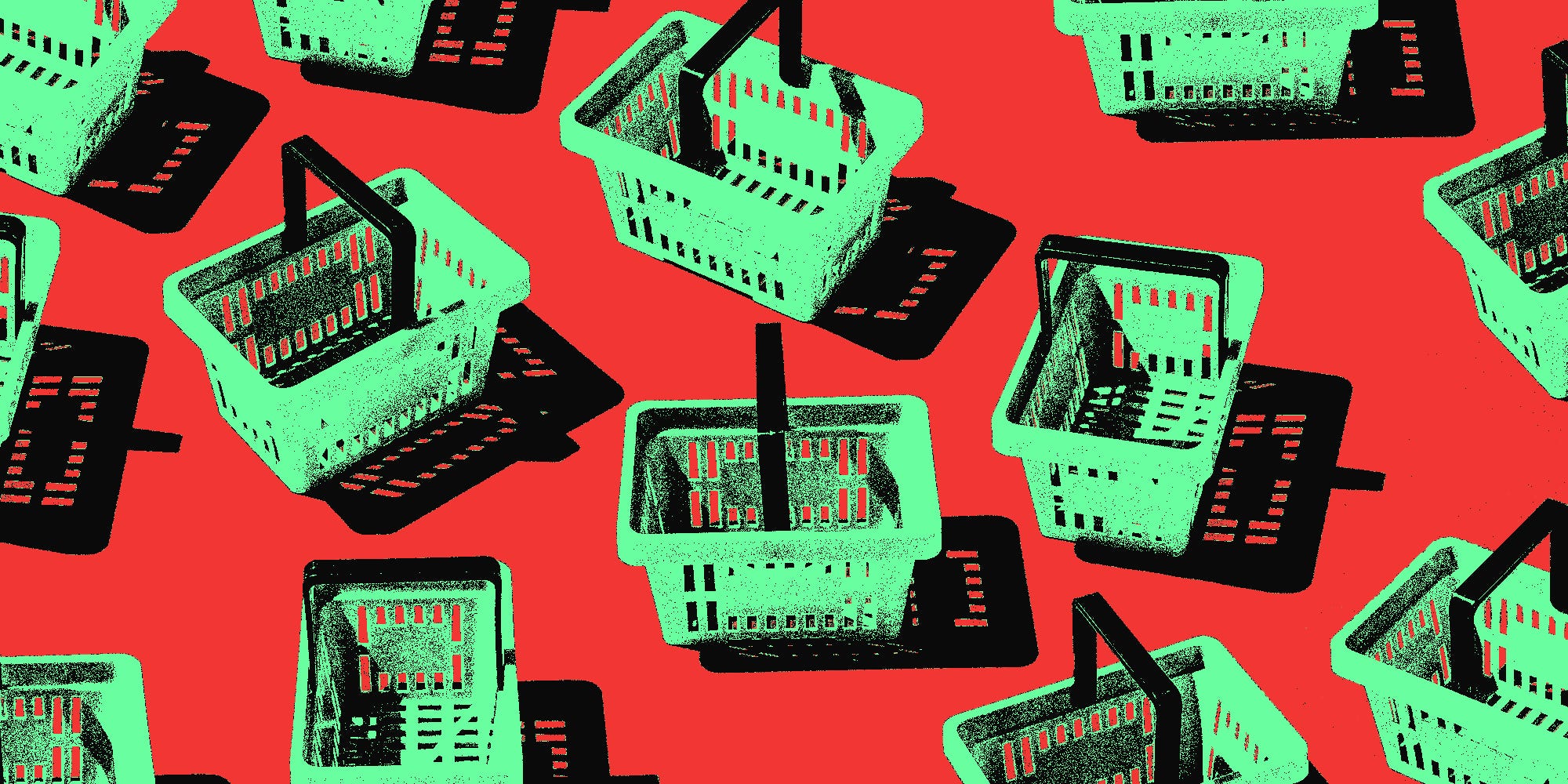
Getty images; Tyler Le/BI
President Donald Trump is an unlikely member of the “buy nothing” movement — or, at least, buy less.
The president consistently suggests that one effect of his tariffs would be to encourage people to buy fewer things. In the face of price increases and potential shortages, Trump says people can and should make do with less. It’s an odd stance coming from any American president, let alone one whose brand is excess. It’s also a concept Americans hate. Buying things is our national pastime.
The most striking example of this line of thinking is the president’s recent obsession with dolls. “Maybe the children will have two dolls instead of 30 dolls, you know? And maybe the two dolls will cost a couple of bucks more than they would normally,” Trump said at a Cabinet meeting in late April. He reiterated the point in a subsequent interview with “Meet the Press” in May. “I don’t think that a beautiful baby girl needs — that’s 11 years old — needs to have 30 dolls. I think they can have three dolls or four dolls because what we were doing with China was just unbelievable,” he said. It’s not just dolls that Trump thinks people should cut back on — he’s also said kids should have five pencils instead of 250.
Treasury Secretary Scott Bessent brought up the dolls thing as well. In an interview with “The Ingraham Angle” on Fox News, he said he would tell a little girl worried about a Barbie-lite household that “you will have a better life than your parents, that you and your family, thanks to President Trump.” She’ll have “economic freedom,” he added, in exchange for some playtime sacrifice.
The White House has a point in that toys have gotten significantly cheaper in recent decades, leaving many families inundated with them. Many parents would agree that they wouldn’t mind accumulating less plastic junk at every birthday, holiday, and trip to Target. At the same time, the doll thing is a little discordant — of all of the items to hold up as the prime example of consumerist excess, a baby doll doesn’t immediately spring to mind.
On a broader level, Trump’s push for Americans to buy less is a fundamental misread of our culture and economy. Our economy hinges on consumer spending, and cutting back could have serious consequences. On the political side of things, austerity isn’t a winning message with the public. In the modern-day American imagination, economic freedom means the freedom to spend our money however we please, mainly on the relatively cheap stuff we can still afford.
“Patriotism and consumerism are about buying, not austerity, generally speaking,” says Gary Cross, a US cultural historian at Penn State and the author of several books on consumerism.
As a nation, we’ve developed a consumer-first identity. What it means to be an American and to have a good American life is intertwined with what and how we spend.
“Consumerism is bound up with that whole definition of living a life of freedom and choice and self-expression,” says Jennifer Smith Maguire, a sociologist at Sheffield Business School who studies consumer culture.
Life milestones and rites of passage are measured by our purchases. Coming of age in your teen years means trips to the mall (yes, Gen Z is bringing the mall back). Adulthood is marked by paying for weddings, buying homes, and furnishing a life. Aging means letting go of all the stuff we’ve accumulated over the course of our lives, which may feel like letting go of pieces of ourselves.
Consumerism is bound up with that whole definition of living a life of freedom and choice and self-expression.
We buy things because we believe our consumption says something about us — we’re cool, we care about the environment, we’re not yet “old.” We’re inundated with different kinds of yogurt in the grocery aisle. Whether we’re shopping at the store or online, the options for jeans are endless. The extreme freedom of choice can be overwhelming, but it’s also what we’ve become accustomed to.
“Products have a natural connection to help us tell the stories about who we are,” says Americus Reed, a marketing professor at Wharton at the University of Pennsylvania. “If I choose A and not B and C, that must reflect something about me as a function of what I know about A, B, and C.”
Americans have come to equate consumerism with democracy. We recognize that we can’t all be rich, but we can all aspire to something that rich people can buy. Full participation in American society isn’t just voting and working, it’s buying.
“Everybody can participate in the market, if only to a little tiny fraction,” Maguire says. “That little tiny fraction leaves open the possibility that through enough hard work and good luck and the kind of Horatio Alger story, I can get to be more of a participant in the democracy of goods.”
Given how the US economy operates, participation from everyone is a good thing. Consumer spending underpins the economy, with personal expenditures accounting for about two-thirds of GDP. Even a small dip could have significant consequences.
“This usually happens on the business side, and it is coordinated — businesses pulling back on investment tends to cause recessions. Because consumer spending is so much larger, you wouldn’t need a huge reduction in consumer spending to have a pretty big macro impact,” says Michael Madowitz, the principal economist at the Roosevelt Institute, a progressive think tank. “Even if it’s just people deciding to wait a few months to buy something, that can have pretty big impacts pretty quickly.”
You wouldn’t need a huge reduction in consumer spending to have a pretty big macro impact.
Beyond the economic boost, going out and spending is generally seen as part of Americans’ patriotic duty. Consumerism is how we fueled the postwar economy and distinguished ourselves from the USSR in the Cold War. After the September 11 attacks, political leaders told Americans not to let what happened “in any way throw off their normal level of activity.” During the pandemic, the federal government sent out checks so people could keep spending.
While “spending through the worries” has worked to rally Americans, sacrifice is not usually a popular political message. Former President Jimmy Carter was knocked for years over a 1977 chat where he donned a cardigan sweater and encouraged Americans to turn down the heat over potential natural gas shortages. Carter’s predecessor, President Gerald Ford, was met with similar trouble when he encouraged Americans to “whip inflation now” by cutting back spending.
This isn’t to say that American consumers haven’t sacrificed in moments of war and crisis in the past, but people are usually only willing to do so “based on the idea that we’re in an emergency,” Penn State’s Cross says, “and I’m not sure that people have really bought that.” Trump is arguing for emergency austerity as a way to stop other countries from what he considers to be taking advantage of the US, but despite the president’s rhetoric on tariffs and trade imbalances, Americans aren’t buying that we’re in severe crisis mode now. Polls show consumers are quite negative on the short-term impact of tariffs, and they’re not broadly sold on long-term benefits, either. Heading into Trump’s presidency, Americans were excited about the economy. Now, they’re alarmed about it, in large part because of his policies. Americans are worried that tariffs are going to hit them where it hurts — their wallets — and the message to just lay off the “buy now” button is not putting them at ease.
People generally do not like being told what to do, including when it comes to their spending. Psychologically, they chafe at the idea that their freedom is being encroached on or they’re being pressured. “When you restrict freedom, you’ll get counterproductive behavior,” Reed says.
On top of a natural aversion to being told no, political polarization makes the reaction even more extreme — many Democrats are going to react negatively to anything a Republican says, and vice versa. Progressives who already don’t like Trump aren’t going to appreciate him telling them to cool it on spending. There’s also something ironic in Donald Trump, the man, telling people to lay off the spending. His entire persona is opulence and overabundance. He, his family, and his allies are making enormous amounts of money with him in the White House. “These guys are getting rich and they’re telling you, ‘Please buy less dolls for Christmas while all this is settling out,'” Reed says.
Cards on the table: It probably would be good for us to have less stuff. It’s not clear if three dolls per child is the right amount, but 30 dolls does seem like a lot. (Though, do kids even play with dolls anymore?) But the president isn’t asking for people to be more thoughtful about their materialistic impulses, to rein in pending for the sake of the environment or to discourage exploitative labor practices. He’s not advocating for people to put down their gadgets to enjoy experiences and the people around them. Instead, he’s asking people to make what seem like arbitrary and unnecessary sacrifices for uncertain promises about a vague vision for a different kind of US economy. And he’s doing so at a moment when many people are already feeling stretched on covering basic necessities.
“It’s a big difference between me saying, ‘I don’t need the extra tie for Father’s Day this year,’ versus people who are like, ‘I’ve been telling you for months that I can’t afford eggs. Why are you making everything else more expensive?'” Madowitz says.
A couple of excess pairs of shoes in the closet or tools in the garage are some of the most accessible versions of economic freedom Americans have left.
Trump’s mission to make more stuff in the United States may be one that many Americans agree with, but accomplishing it is much more complex than the current undertaking accounts for. As much as consumers say they would pay more for American-made goods, when the rubber hits the road, they usually go for the cheaper option, even if it’s produced abroad. Many workers don’t want the masculine-coded manufacturing jobs the White House seems so focused on, let alone ones sewing shoes in factories or, as Trump seemingly envisions, making dolls. There’s a gendered air to the dolls focus as well — the White House is arguing that people who complain about their policies are worrying about trivial things are for trivial little girls. Consumerism is often coded as feminine, and the world Trump envisions has a masculine, austere bent to it, one where real men only buy the real things they need. A Rolls-Royce gets a tariff exemption. A Barbie does not.
Many Americans don’t get to do a lot of choosing these days. Big-ticket items, such as housing, schooling, and healthcare, are prohibitively expensive. Inflation is pushing more and more things out of reach. A couple of excess pairs of shoes in the closet or tools in the garage are some of the most accessible versions of economic freedom Americans have left — and, yes, a bunch of toys, if they so insist.
Emily Stewart is a senior correspondent at Business Insider, writing about business and the economy.
The post Trump is asking Americans to do the one thing they hate most: buy less stuff appeared first on Business Insider.




